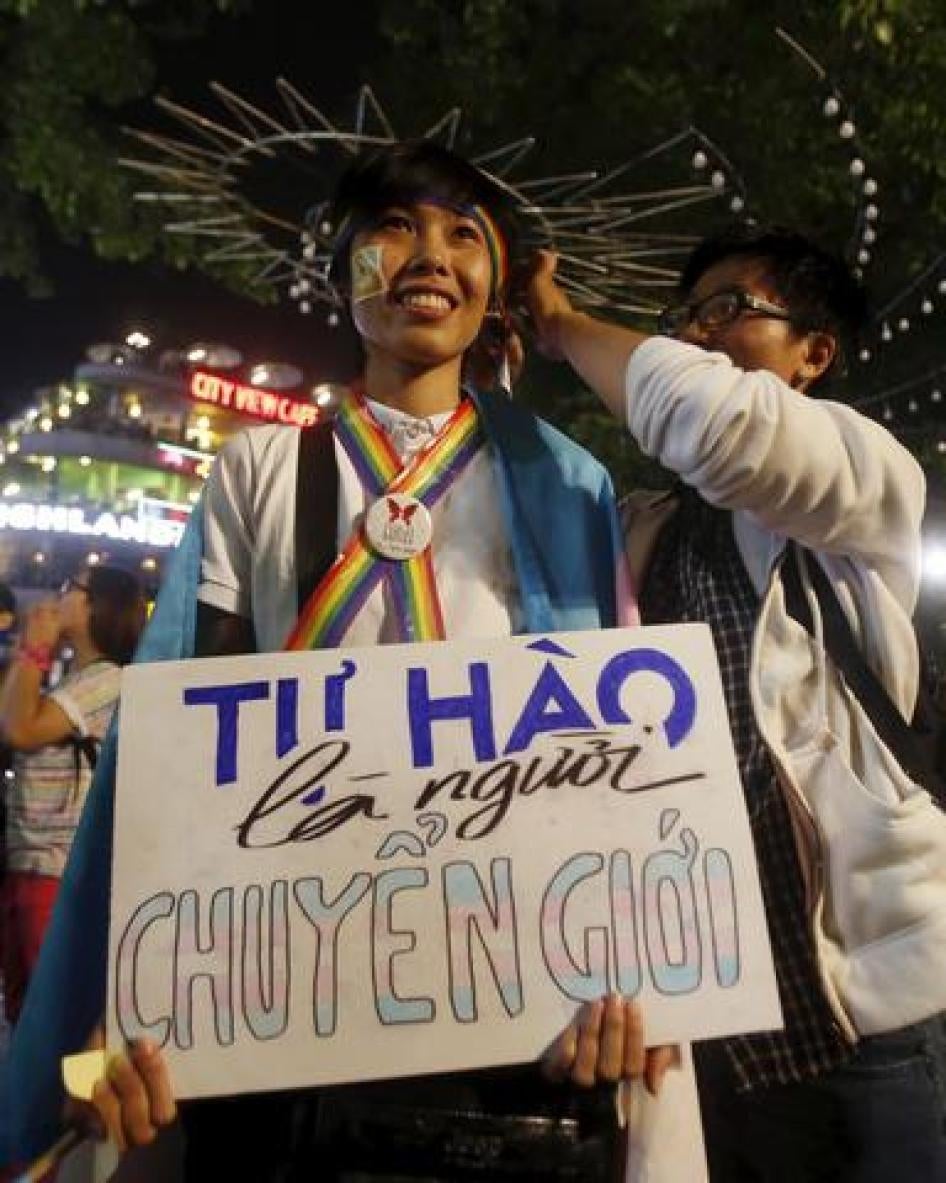(Berlin) – On November 24, 2015, the Vietnamese National Assembly approved a bill to legalize sex reassignment surgery and to introduce the right to legal gender recognition for transgender people who have undergone such surgery.
The law allows people who wish to undergo gender affirming surgeries to do so in Vietnam rather than abroad, and to subsequently change the gender marker on their official documents. This constitutes a small, but significant step toward recognition of transgender people’s rights, Human Rights Watch said today.
However, the requirement for surgical procedures as a precondition for legal gender recognition imposes a burden on transgender people that is at odds with their fundamental rights to be recognized in the gender with which they identify. The minister of Justice announced that details about the required surgery will be published in additional legislation, sometime in 2016.
“We are celebrating this victory not only for our community, but also for our country. Vietnam has become more tolerant and inclusive,” said Nguyen Hai Yen, project manager of ICS (Instruct, Connect and Service), the Vietnamese organization striving for equal rights for LGBT people, based in Ho Chi Minh City. “Still, a lot of work needs to be done to ensure a gender recognition procedure that meets transgender people’s needs. In amending the civil code, an important door has been opened for us.”
282 from the 366 members of the National Assembly voted in favour of the new law – a revision of article 37 of the 2005 Civil Code and Decree No. 88/2008/ND-CP – which is expected to come into effect on January 1, 2017.
Under the current civil code, Sex Reassignment Surgery (SRS), is prohibited for transgender people, and only intersex people are permitted to undergo SRS. In the past, some Vietnamese transgender people went to Thailand to undergo SRS. However, many other Vietnamese transgender people have chosen not to have their body operated upon, and under the new provisions of the law, they would still be unable to change their gender marker.
“By changing article 37 the Vietnamese government has taken a small, but significant step forward on the path of recognizing transgender rights for which it should be commended,” said Boris Dittrich, advocacy director in the Lesbian, Gay, Bisexual, and Transgender (LGBT) rights program at Human Rights Watch. “But Vietnam should also allow transgender people who do not wish to undergo surgery to have their preferred gender legally recognized.”
According to the Yogyakarta Principles – a codification of existing international law in relation to the rights of LGBT people – countries should consider measures that allow all people to define their own gender identity. Argentina’s gender recognition law, adopted in 2012, requires neither surgical nor hormonal intervention, nor any third party involvement, and is widely considered to be the law with the least obstacles for transgender people to be legally recognized in the gender with which they identify. Other countries – Colombia, Denmark, Ireland, and Malta – have explicitly eliminated significant barriers to legal gender recognition, including surgery, forced sterilization, psychiatric evaluation, lengthy waiting periods, and divorce. Several other countries also allow gender recognition without SRS and hormone therapy.
In 2010, the World Professional Association of Transgender Health (WPATH), an international multidisciplinary professional association stated: “No person should have to undergo surgery or accept sterilization as a condition of identity recognition.” In a January 2015 policy statement, WPATH called on governments “to eliminate unnecessary barriers, and to institute simple and accessible administrative procedures for transgender people to obtain legal recognition of gender, consonant with each individual’s identity, when gender markers on identity documents are considered necessary.”
“In further revising the law, Vietnam should take guidance from the Yogyakarta Principles and the growing medical consensus that surgery should not be a requirement to change one’s gender identity,” Dittrich said. “Transgender people in Vietnam should have the right to decide for themselves who they are.”







